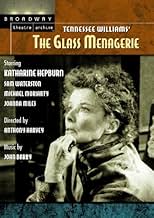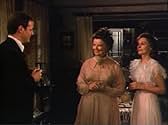Agrega una trama en tu idiomaAmanda Wingfield dominates her children with her faded gentility and exaggerated tales of her Southern belle past. Her son plans escape; her daughter withdraws into a dream world. When a "ge... Leer todoAmanda Wingfield dominates her children with her faded gentility and exaggerated tales of her Southern belle past. Her son plans escape; her daughter withdraws into a dream world. When a "gentleman caller" appears, things move to crisis point.Amanda Wingfield dominates her children with her faded gentility and exaggerated tales of her Southern belle past. Her son plans escape; her daughter withdraws into a dream world. When a "gentleman caller" appears, things move to crisis point.
- Dirección
- Guionistas
- Elenco
- Ganó 4 premios Primetime Emmy
- 4 premios ganados y 3 nominaciones en total
- Dirección
- Guionistas
- Todo el elenco y el equipo
- Producción, taquilla y más en IMDbPro
Opiniones destacadas
Furthermore, this presentation is far too static. Granted, stage plays are often difficult to translate to the screen, but this ABC TV-movie feels far too confined. Many of Williams' other plays have made the trip from boards to celluloid quite effectively, opening up with the freedom allowed by location filming.
Yes, this film is definitely worth seeing. However, I am now curious to see Gertrude Lawrence (1950), Shirley Booth (1966) and Joanna Woodward (1987) in the lead role.
Waterston is a bit of a scene chewer here, and I'm surprised at the Emmy wins for the other two leads, but in 1974, TV movie and series drama nominations were combined in the supporting categories. For Best Actress in a Drama, Hepburn was up against Tyson for "...Miss Jane Pittman," Elizabeth Montgomery for "A Case of Rape," and Leachman for "The Migrants." Tyson rightfully won.
1973's "The Glass Menagerie" directed by Anthony Harvey and written by Stewart Stern, was a televised movie. Based on the play by Tennessee Williams, the movie's runtime is 100 minutes. Rated PG.
"The Glass Menagerie" is a drama set in an apartment in St. Louis, and most of the story takes place during the night. The story takes a dark turn towards the end and seems to phase into a tragedy that adds a sense of sadness. The movie definitely has its changes from the play, but then again, no movie follows the book perfectly. The movie has is still very intriguing to watch because of the life the actors put into their work, specifically Katherine Hepburn. Katherine Hepburn portrays an awesome 1940's mother who hasn't let go of the past. She consistently refers to her younger days when she had many "gentleman callers" and seems to envy her daughters young age, yet she is upset that she is wasting it. Laura's glass menagerie, which is what the movie is titled after, plays a significant role in the plot. Laura's menagerie symbolizes her own fragileness and foreshadows future events in the story. The screenplay by Stewart Stern forms a clear image of the main points of the original story written by Tennessee Williams. The movie may not depict the story line perfectly, but no movie ever compares to the book.
Prior to watching this 1973 version with Katharine Hepburn, Sam Waterston, Michael Moriarty and Joanna Miles, there were two versions seen first. One was the 1987 version, which was my first filmed production of 'The Glass Menagerie'. The other was the Gertrude Lawrence and Jane Wyman film. Although the latter was a very respectable attempt despite the disappointing ending, the 1987 version is much better and of these three versions it's my favourite. This is a very worthy and really quite good production though where the detail and spirit is intact, with nothing toned down, nothing really tacked on and there isn't any re-ordering or re-working that affects any coherence (the case with the 80s TV film of 'Sweet Bird of Youth').
This production of 'The Glass Menagerie' is not perfect by all means. It is too dimly lit and makes the production a bit drab at times. Did feel that it could have opened up the drama more, the potential problem with television film adaptations of plays is being too much of a filmed play and being stagy, found that to be the case here.
In 'The Glass Menagerie', the dialogue is classic Williams. Just wished in this production that we had more time to hear it and take it all in and that the dialogue delivery wasn't as fast as it could be in places, especially with Katharine Hepburn.
However, lighting aside it is well and authentically designed and the photography isn't too intimate or distant. The audio adds to the atmosphere and doesn't jar with it. Despite the rushed line delivery at times, the dialogue may be talky but there is no denying its emotion. The staging also isn't perfect, but it's cohesive and just about avoids being over-heated and doesn't get dull. The ending like that of the play stays with you emotionally.
All four leads are hugely compelling with many moments of brilliance. Hepburn does indeed dominate but quite a lot of it is down to the character herself, she plays the heck out of the character and it's quite a towering portrayal overall regardless of some of the dialogue delivery and try-too-hard accent. Miles is very moving as Laura and pre-'Law and Order' Waterston is the embodiment of intensity. Moriarty is a different and interesting Jim and it was great to see a more likeable side.
Summing up, quite well done. 7/10
¿Sabías que…?
- TriviaTennessee Williams preferred this film version of his play over the 1950 one.
- Citas
Amanda Wingfield: You are the only young man that I know of who ignores the fact that the future becomes the present, the present becomes the past, and the past turns into everlasting regret if you don't plan for it.
- ConexionesFeatured in The 26th Annual Primetime Emmy Awards (1974)
Selecciones populares
Detalles
- Fecha de lanzamiento
- País de origen
- Sitio oficial
- Idioma
- También se conoce como
- Tennessee Williams' The Glass Menagerie
- Locaciones de filmación
- Productora
- Ver más créditos de la compañía en IMDbPro
Contribuir a esta página

























